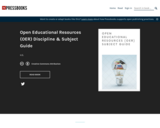
Word Count: 22091
(Note: This resource's metadata has been created automatically by reformatting and/or combining the information that the author initially provided as part of a bulk import process.)

Word Count: 22091
(Note: This resource's metadata has been created automatically by reformatting and/or combining the information that the author initially provided as part of a bulk import process.)

Word Count: 8721
(Note: This resource's metadata has been created automatically by reformatting and/or combining the information that the author initially provided as part of a bulk import process.)

A transdisciplinary approach
Short Description:
This book presents a genre-based approach emphasizing strategies that derive from a field of research focusing on strengthening the language skills of multilingual English speakers.
Word Count: 30964
(Note: This resource's metadata has been created automatically by reformatting and/or combining the information that the author initially provided as part of a bulk import process.)

Short Description:
Compiled by Jennifer Snoek-Brown, Tacoma Community College Library. This directory of OER subject guides was created for Tacoma Community College faculty and staff, and reflects TCC credit, continuing education, and corrections course offerings. The purpose of these guides is to help faculty and staff more easily find and review OER in their areas so that they can make decisions about quality, accuracy, relevancy, and potential use.
Long Description:
This directory of OER subject guides was created for Tacoma Community College faculty and staff, and reflects TCC credit, continuing education, and corrections course offerings. The purpose of these guides is to help faculty and staff more easily find and review OER in their areas so that they can make decisions about quality, accuracy, relevancy, and potential use.
Word Count: 2923
(Note: This resource's metadata has been created automatically by reformatting and/or combining the information that the author initially provided as part of a bulk import process.)
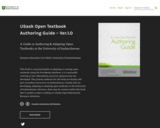
A Guide to Authoring & Adapting Open Textbooks at the University of Saskatchewan
Short Description:
This book is a practical guide to adapting or creating open textbooks using the PressBooks platform. It is continually evolving as new information, practices and processes are developed. The primary audience for this book are faculty and post-secondary instructors in Saskatchewan, Canada who are developing, adapting or adopting open textbooks at the University of Saskatchewan. However, there may be content within this book that is useful to others working on similar Open Educational Resource initiatives.
Long Description:
This book is a practical guide to adapting or creating open textbooks using the PressBooks platform. It is continually evolving as new information, practices and processes are developed. The primary audience for this book are faculty and post-secondary instructors in Saskatchewan, Canada who are developing, adapting or adopting open textbooks at the University of Saskatchewan. However, there may be content within this book that is useful to others working on similar Open Educational Resource initiatives.
Word Count: 17157
(Note: This resource's metadata has been created automatically by reformatting and/or combining the information that the author initially provided as part of a bulk import process.)

Short Description:
A learning resource to help USask educators reshape their teaching practices by using the principles and approaches of UDL.
Word Count: 17101
(Note: This resource's metadata has been created automatically by reformatting and/or combining the information that the author initially provided as part of a bulk import process.)

Short Description:
Our primary goal in writing University Success is to help you succeed in university. This is a how-to-manual for your first year of study.
Long Description:
Our primary goal in adapting University Success from a US-based College Success textbook is to help you succeed in university.
University Success has a student-friendly format arranged to help you develop the essential skills and provide the information you need to succeed in university. This is not a textbook full of theory and extensive detail that merely discusses student success; rather, this is a how-to manual for your first year of study. The book provides realistic, practical guidance ranging from study skills to personal health, from test taking to managing time and money. Furthermore, University Success is accessible—information is presented concisely and as simply as possible.
University Success has the following features to help you achieve your goals: Each chapter asks you to evaluate yourself because success starts with recognizing your strengths and weaknesses, your hopes and desires, and your own personal, individual realities. You’ll develop your own goals based on these self-assessments, determining what success in college really means for you as an individual. Throughout the book, you will find numerous interactive activities created to help you improve your skills. To assist you with this, the material is presented in easily digestible “chunks” of information so you can begin applying it immediately in your own life—and get the most out of your university education. Table of Contents Chapter 1: You and Your University Experience Chapter 2: Staying Motivated, Organized, and On Track Chapter 3: Thinking about Thought Chapter 4: Listening, Taking Notes, and Remembering Chapter 5: Reading to Learn Chapter 6: Preparing for and Taking Tests Chapter 7: Interacting with Instructors and Classes Chapter 8: Writing for Classes Chapter 9: The Social World of University Chapter 10: Taking Control of Your Health Chapter 11: Taking Control of Your Finances Chapter 12: Taking Control of Your Future
Word Count: 141784
(Note: This resource's metadata has been created automatically by reformatting and/or combining the information that the author initially provided as part of a bulk import process.)

The University of Florida Book of Insect Records (UFBIR) names insect champions and documents their achievements. Each chapter deals with a different category of record.
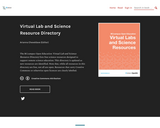
Short Description:
The BCcampus Open Education Virtual Lab and Science Resource Directory lists free science resources designed to support remote science education. This directory is updated as new resources are identified. Note that, while all resources in this directory are free, not all are open. Resources that carry Creative Commons or otherwise open licences are clearly labelled.
Long Description:
The BCcampus Open Education Virtual Lab and Science Resource Directory lists free science resources designed to support remote science education. This directory is updated as new resources are identified. Note that, while all resources in this directory are free, not all are open. Resources that carry Creative Commons or otherwise open licences are clearly labelled.
Word Count: 8477
(Note: This resource's metadata has been created automatically by reformatting and/or combining the information that the author initially provided as part of a bulk import process.)
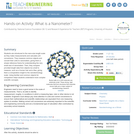
Students are introduced to the nano-size length scale as they make measurements and calculate unit conversions. They measure common objects and convert their units to nanometers, giving them a simple reference frame for understanding the very small size of nanometers. Then, they compare provided length data from objects too small to measure, such as a human hair and a flea, giving them a comparative insight to the nanotechnology scale. Using familiar and common objects for comparison helps students understand more complex scientific concepts.
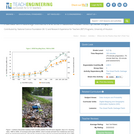
Through an adult-led field trip, students organized into investigation teams catalogue the incidence of plastic debris in different environments. They investigate these plastics according to their type, age, location and other characteristics that might indicate what potential they have for becoming part of the Great Pacific Garbage Patch (GPGP). Students collect qualitative and quantitative data that may be used to create a Google Earth layer as part of a separate activity that can be completed at a computer lab at school or as homework. The activity is designed as a step on the way to student's creation of their own GIS Google Earth layer. It is, however, possible for the field trip to be a useful learning experience unto itself that does not require this last GIS step.
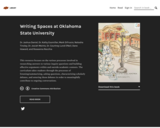
Short Description:
This resource focuses on the various processes involved in researching answers to various inquiry questions and building effective arguments within and outside academic contexts. The curriculum takes students through the processes of listening/summarizing, asking questions, characterizing scholarly debates, and entering those debates in order to meaningfully contribute to ongoing conversations.
Long Description:
This resource incorporates and contextualizes material from Writing Spaces. Writing Spaces is, as Dr. Daniel likes to say, the “OG” of all things commercial-free-textbooks for first-year writing. If terms like “book series” and “peer-reviewed essays” or “by teachers for students” or “free” sound reminiscent of Who Teaches Writing, it is because Writing Spaces was and is the inspiration for Who Teaches Writing. Who Teaches Writing was no brain child of ours, but just the end result of us keeping up with good practice from smart people who have been doing this work for many years. Dr. Daniel had the good fortune to serve as web editor for Writing Spaces for a time, and he knows their work well. While we borrowed their process to create our textbook, this textbook uses existing Writing Spaces articles and organizes them around the English 1213 curriculum, along with abstracts and introductions from our editorial team (you’ll be meeting them in each section) to deliver you another commercial free textbook. Not only is it entirely possible to create free textbooks for FYC students, it has been for a while. This is because, well, Writing Spaces has been at it for a minute; as FYC Director, Dr. Daniel does not believe in unnecessary textbook costs.
Word Count: 12326
(Note: This resource's metadata has been created automatically by reformatting and/or combining the information that the author initially provided as part of a bulk import process.)